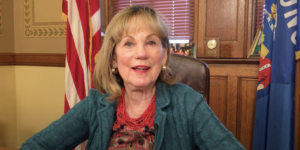‘Leftists are doubling down on gaslighting parents.’ DeAngelis fires back at professor’s claim parental rights concerns are based on a ‘made-up crisis’
A round table panel on education sparked controversy when a professor argued that parents having no say in schools is “a made-up crisis.”
The panel was comprised of Corey DeAngelis, senior…

A round table panel on education sparked controversy when a professor argued that parents having no say in schools is “a made-up crisis.”
The panel was comprised of Corey DeAngelis, senior fellow at the American Federation for Children, Angela Morabito, former press secretary for the U.S. Department of Education, Joshua Cowen, a professor of education policy at Michigan State University, and Staci Childs, member of the Texas State Board of Education.
At one point, Cowen said he didn’t think many of the issues being discussed were of real concern to the average parent.
“I don’t think … this is bothering most parents,” he said. “I don’t even know that [teachers’ unions are] something the average American thinks about.”
Cowen also argued that the idea that parents aren’t involved in schools or that they have no say is “a made up crisis.”
After the panel, DeAngelis posted a clip of Cowen’s claim on X, formerly known as Twitter, along with a screenshot revealing Cowen had blocked him on the platform.
“Leftists are doubling down on gaslighting parents,” DeAngelis told The Lion of Cowen’s claim. “You have to live in quite the socialist echo chamber to believe that parental concerns about public education are just a ‘made up crisis.’
“Parents have woken up to the leftist indoctrination in the government school system, and they’re fighting back.”
DeAngelis also accused Cowen of being a “hypocrite” for fighting against school choice despite having attended private school himself.
The panel began by discussing why public education is failing its students, particularly minority students.
“Public schools are largely failing black students,” said Childs, who is African American. “Every student is different and if we don’t take the time to understand what that student needs to be successful, how can they be successful?”
DeAngelis also blamed schools, which he says “discriminate on the basis of zip code.”
He explained that families who don’t like their assigned public school have to either pay to attend a private school or move to a better district, which he called “totally ridiculous.”
The panel’s moderator also noted the renewed interest in state and local school board elections, which have become contentious in the last few years.
“I think for a long time we just assumed that the teachers and administrators were doing the right thing for kids,” observed Childs, “but … as people started to become more privy to the facts and to the statistics … they are upset and they’re saying, “If you’re not going to do it, I’m going to do it myself.”
“Students aren’t failing. Students are being failed by bureaucrats who do not have their best interests at heart,” added Morabito.
However, the panel became heated when DeAngelis and Cowen debated the merit of school choice programs.
“The larger the program, the worse the [academic] results have been in the last ten years,” claimed Cowen. “It’s just not a solution to this academic issue.”
DeAngelis said the evidence actually shows parental choice generally leads to improved academic performance.
“School choice is a rising tide that lifts all boats,” DeAngelis argued. “Twenty-six of 29 studies find statistically significant positive effects of private school choice competition on the outcomes in the public schools.”
The panel was hosted by Crisis in the Classroom, the K-12 education franchise of the Sinclair Broadcast Group.



